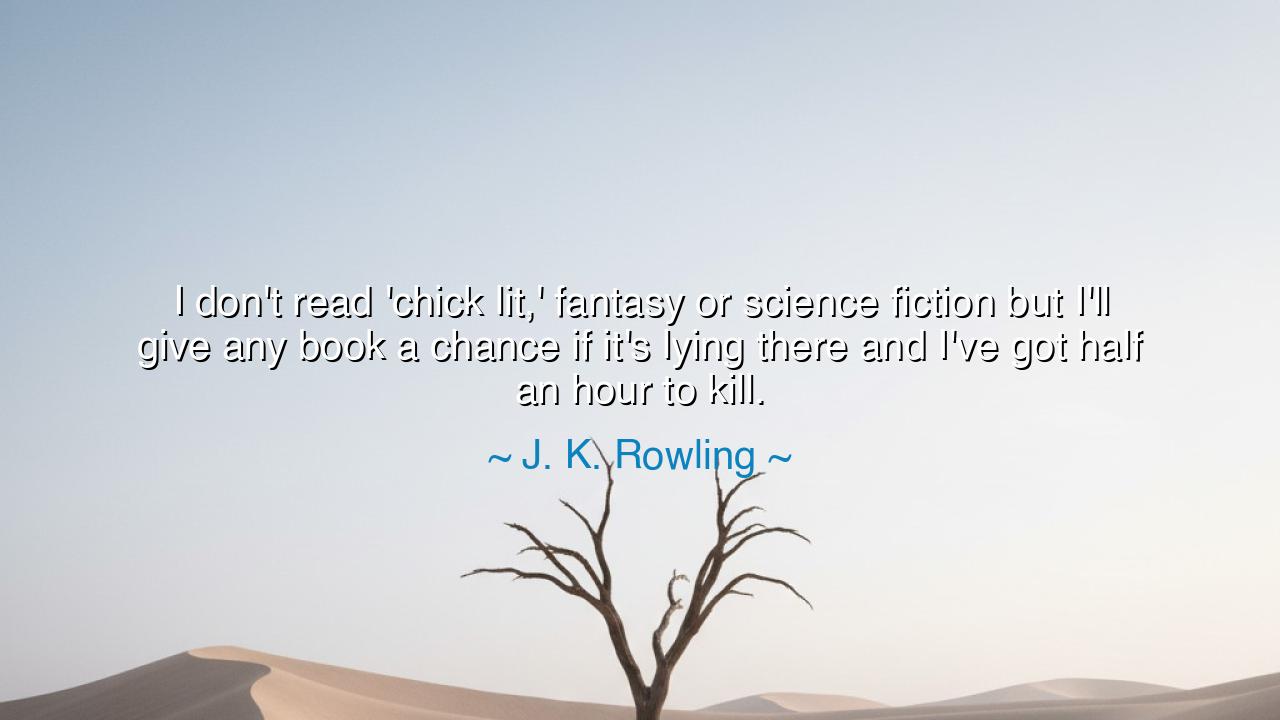
I don't read 'chick lit,' fantasy or science fiction but I'll
I don't read 'chick lit,' fantasy or science fiction but I'll give any book a chance if it's lying there and I've got half an hour to kill.






In the journey of a life shaped by curiosity and learning, there are few principles as vital as the willingness to embrace the unexpected, the unfamiliar, and the unconventional. J.K. Rowling’s words, “I don’t read ‘chick lit,’ fantasy or science fiction but I’ll give any book a chance if it’s lying there and I’ve got half an hour to kill,” capture the essence of an open mind, one that does not judge a book by its genre or reputation but instead allows the unknown to unfold on its own terms. This humility, the willingness to step outside one’s comfort zone, to give something a chance, is a philosophical act, one that reflects the very nature of wisdom and the love of learning.
In the world of the ancients, Socrates spoke of the importance of questioning and learning, of embracing the search for truth wherever it may lead. For Socrates, true wisdom was not found in rigid doctrines or narrowly defined paths but in the willingness to explore, to engage with new ideas, and to discover wisdom in places one might least expect. Much like Rowling’s approach to books, Socrates did not limit his pursuit of knowledge to any one style or discipline, but sought the truth in the variety of human thought. His method, the Socratic Method, was an act of openness, a way of engaging in dialogue that allowed all perspectives to be heard, even those that seemed trivial or out of place. The power of his philosophy was not in seeking only what was familiar, but in welcoming the unknown into the conversation.
Rowling’s own approach to reading reflects this ancient wisdom. By giving any book a chance, even if it’s outside her usual interests, she embodies the principle that growth comes not from sticking rigidly to what we know but from venturing into the uncharted. This resonates deeply with the story of Leonardo da Vinci, whose insatiable curiosity about the world led him to explore a vast array of subjects, from anatomy to engineering, from painting to flight. Like Rowling’s approach to books, Leonardo did not allow his intellect to be limited by convention; he sought knowledge from every source, allowing the diversity of his learning to fuel his genius. Da Vinci’s genius was not just in his ability to create beautiful art, but in his willingness to engage with the world as it truly was, filled with endless possibilities and hidden connections waiting to be discovered.
This willingness to embrace the unfamiliar can also be seen in the story of Mahatma Gandhi, who, although initially deeply rooted in the traditions of his native India, was open to learning from the diverse cultures and philosophies he encountered throughout his life. Gandhi’s time in South Africa, where he first embraced the principle of nonviolent resistance, was a moment where he allowed new ideas to reshape his worldview. Much like Rowling with her books, Gandhi was open to exploring new perspectives, a trait that allowed him to become the leader of a revolutionary movement that not only changed the course of Indian history but influenced global movements for justice and peace.
In our own lives, the lesson in Rowling’s words is profound. How often do we shut ourselves off from the new, the different, the unfamiliar, simply because it doesn’t fit our preconceptions or our established ways of thinking? How often do we judge a book, an idea, or a person by its cover, without giving it the opportunity to reveal its deeper value? The act of giving a chance to something unfamiliar, as Rowling suggests, is not just about exploring new books or genres, but about developing an openness to all experiences, to new ways of thinking, and to new possibilities. It is this open-mindedness, this embracing of the unknown, that fosters the growth of the individual and the collective.
In a world that often feels divided and polarized, the ability to see beyond our biases and engage with different perspectives is more essential than ever. Just as Rowling encourages us to give any book a chance, we must apply this principle in our interactions with others. We must approach conversations, debates, and ideas with an open heart, willing to listen and understand, not just react or reject. By doing so, we foster an environment of growth, respect, and collaboration. In every conversation, there is the potential for a new chapter to begin, for a new idea to be discovered, for a moment of shared wisdom to unfold.
Let us, therefore, be like Rowling, like Socrates, and like Leonardo da Vinci, embracing the unknown and the unfamiliar with open hearts and minds. Let us challenge ourselves to read widely, to learn constantly, and to engage deeply with the world around us. Just as every book offers a new journey, so too does every experience, every person, and every challenge. By embracing this boundless curiosity, we open ourselves to limitless potential for growth, connection, and wisdom. In doing so, we enrich not only our own lives but the lives of all those with whom we come into contact. The chance to grow is always there — we must simply choose to take it.






AAdministratorAdministrator
Welcome, honored guests. Please leave a comment, we will respond soon